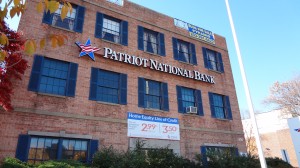
After three years of losses, Patriot National Bancorp Inc. earned $250,000 in the third quarter under the guidance of controlling shareholder Michael Carrazza ”“ while also quietly inking a deal that could pay more than $1 million to an entity Carrazza manages if Patriot raises new capital or consummates a sale of the company.
Stamford-based Patriot National runs 15 retail bank branches, the majority in Fairfield County, and three in New York.
In the first quarter, it sold off nearly $67 million in non-accrual loans ”“ those on which borrowers were not making payments ”“ and by the third quarter had cut its bad loan portfolio to under $22 million, 4.7 percent of total loans outstanding.
It also increased lending in the third quarter ”“ albeit slightly, with total loans outstanding up roughly $1 million to $453 million. It had some 370 small-business loans outstanding totaling $63 million, according to data furnished to the Federal Deposit Insurance Corp., compared to more than 350 loans totaling $58 million in the second quarter of 2011.
Martin Noble resigned in September as chief lending officer of Patriot National, the following month joining Yonkers, N.Y.-based Hudson Valley Bank, which has a half-dozen branches in Fairfield County.
Patriot National reported having 135 employees as counted on a full-time basis as of September, down more than 20 from the start of the year.
Patriot National scheduled its annual meeting with stockholders for Dec. 13 at the Stamford office of Robinson & Cole L.L.P., with the company listing nearly 600 shareholders of record as of October. This month, Patriot National filed notice with the SEC that it had entered a financial advisory agreement with an entity controlled by Carrazza. Upon the closing of a financial transaction to include Patriot National issuing securities or reaching a merger agreement, among other possible deals, the Carrazza-controlled entity will get 3 percent of the first $50 million of consideration received by Patriot National, 2 percent of an amount between $50 and $100 million, and 1 percent of any amount over that.
“In the world of private equity, this is standard drill,” Carrazza said. “We would have to hire investment bankers that would include retainers or success fees that would be significantly more ”¦ (and) who would be pushing a deal.”

















